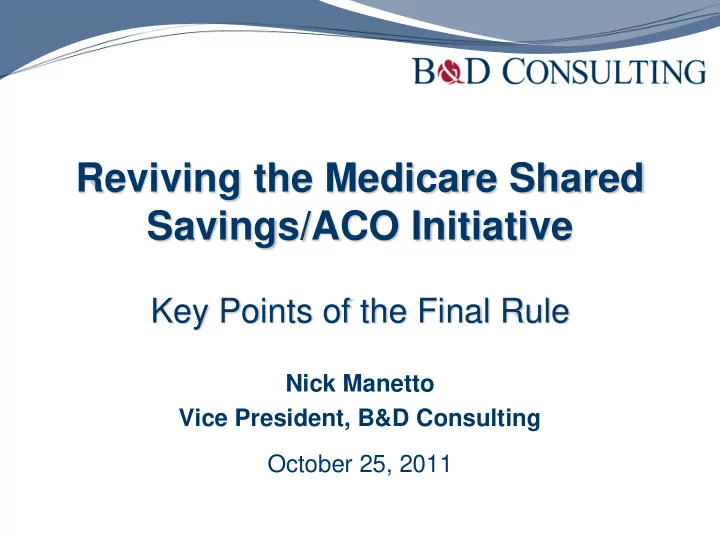

Reviving the Medicare Shared Savings/ACO Initiative Key Points of the Final Rule Nick Manetto Vice President, B&D Consulting October 25, 2011
What is an ACO? Rooted in a 2007 paper by Elliott Fisher and colleagues at Dartmouth. Included in Nov. 2008 call to action on health reform by Finance Committee Chairman Sen. Max Baucus. Overall goal: Improve care, improve health outcomes, and lower costs. (Triple Aim) Provider, rather than insurer, organized. Tenets and goals largely supported regardless of ideology and position on PPACA . 2
The ACO Pathway Late 2010/Early 2011: Many providers eagerly awaiting issuance of proposed rule, steady stream of announcements of new “ACOs” being formed. Spring 2011: Muted to negative response to proposed rule. Top concerns include requiring all participants to take some level of risk, large number of quality measures, high up-front costs. Fall 2011: Much more positive response from providers, overall, to final ACO rule. Concerns remain but far more muted than before. 3
Proposed Rule Vs. Final Rule Will the final rule released on Oct. 20 th turn the Medicare Shared Savings Initiative into the next Lazarus? Or… Will the sweeteners be seen as too little, too late, by providers? 4
What Stakeholders are Saying AHIP : Concerned about provider consolidation, not happy final rule removes mandatory anti-trust review for all ACOs, support stronger metrics. Hospitals: Pleased with changes limiting risk, fewer quality measures and other changes. Physicians: Similarly pleased, particularly with changes that limit risk, allow sharing in first dollar savings and reduce quality measures. 5
The Final ACO Rule In a nutshell: Significant changes made to sweeten the deal and attract providers to the program: Risk Quality measures Thresholds to share in savings Bar for EHR use Earlier access to claims data Broader participant eligibility (FQHCs, RHCs) Advance payment support for small/rural ACOs 6
Key Changes: Reduced Risk Proposed Rule Final Rule 2 models or tracks: One-sided & No pain, only gain, for one-sided Two-sided: models all three years. ACOs limited to one 3-year • One-sided: No risk first 2 years, at performance period in a one-sided risk final year model. • Two-sided: Providers at risk all 3 Track 1 participants seeking interim years, eligible for greater shared payments will need to demonstrate savings as a carrot. ability to repay losses in application. Must be able to demonstrate repayment of losses equal to at least 1 percent of Part A & B FFS expenditure benchmark for assigned beneficiaries. 7
Key Questions Will a critical mass of providers believe the reward outweighs the risk and opt to go at-risk? If most providers pursue the non-risk track, will they be proactive in evaluating and managing risk to prepare for subsequent periods of being at risk? 8
Key Changes: Fewer Quality Measures Proposed Rule Final Rule 65 Measures across 5 domains 33 Measures across 4 domains: proposed •7 Patient/caregiver experience •6 Care coordination/patient safety •8 Preventative health •12 At-risk populations Pay for performance (P4P) phased in: •Year 1: Pay for reporting only •Year 2: 25 P4P, remainder reporting •Year 3: 32 P4P Removes 50 percent EHR meaningful use requirement; instead gives double weight to that measure. 9
Key Changes: Beneficiary Assignment Proposed Rule Final Rule Done retrospectively. Done retrospectively but ACOs will be provided quarterly information on likely or potential beneficiaries, not actual beneficiaries. Two-step proposal for assigning beneficiaries: • Plurality of primary care services from primary care doctor; or • Plurality of primary care services from non-physician ACO professionals such as nurse practitioners or physicians assistants. 10
Other Key Points of Final Rule Start Date: First round to start April 1 or July 1, 2012. Those ACOs will have a longer initial performance “year” of 21 or 18 months, respectively. Maximum Savings Rate : Up to 50 percent for Track 1 (No Risk), up to 60 percent for Track 2. Slight decline from proposed rule due to elimination of bonuses for including FQHC and RHCs since they are now eligible participants. 11
Other Key Points of Final Rule Minimum Savings Rate : Track I: Finalizing sliding scale proposal where fewer beneficiaries = higher MSR; Track 2: Flat 2 percent. Also first-dollar sharing above MSR for both tracks. Minimum Loss Rate: Finalizing; loss must exceed 2 percent of benchmark for ACOs to be responsible for paying back CMS. 12
Other Key Points of Final Rule Performance Withhold: Scraps 25 percent withhold; ACOs will need to demonstrate method for repaying losses within applications. Will have 90 days rather than 30 to repay CMS. Shared Loss Caps: 5 Percent year one, 7.5 percent year 2, 10 percent year 3. 13
Other Key Points of Final Rule Legal Entity : ACOs must be a legal entity under state law. Existing legal entities, such as a hospital, will not have to form a separate entity. State Compliance : Expect ACOs to comply with state laws . Antitrust: DoJ and FTC scrap mandatory review for ACOs that fall within “safety zone.” Advance Payment Initiative : Upfront payments to attract small & rural participants. 14
Questions or Comments? Nick Manetto Vice President, Health & Life Sciences B&D Consulting 202.312.7499 nick.manetto@bakerd.com 15
Recommend
More recommend